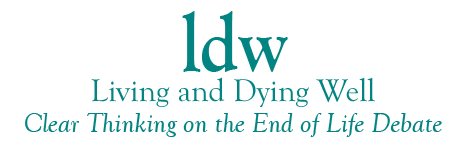What we do
LDW Researches and analyses the evidence surrounding the end-of-life debate.
Hard evidence and rigorous analysis in place of spin and sensationalism
What is the end-of-life debate?

Almost daily we hear or read stories about dying - about how we want to die, how we are dying and how we should be dying. For example, it is suggested in some quarters that there should be a 'right to die' - meaning that doctors should be licensed by law to supply lethal drugs to terminally ill patients at their request. Alarmist stories also appear sometimes in the press suggesting that doctors and nurses are depriving dying people of food and water and hastening their deaths.
What are we to make of all this?
What does Living and Dying do Well?

What do we think?
Our Patrons and Members include experts in the law, medicine, mental health, ethics and other disciplines related to the end-of-life debate. They do not hold identical views on all aspects of the debate, but they share a common concern that public safety is of paramount importance in this area and that some of the ideas that are being put forward - for example, that doctors should be licensed by law to supply lethal drugs to terminally ill patients to help them commit suicide - are not compatible with this and would put vulnerable people at serious risk of harm. We fully respect the motivations of those who may take a different view. Qualities such as compassion and sincerity are common currency to both sides of the 'assisted dying' debate. What is needed, however, is rigorous analysis of the evidence, an understanding of the facts - for example, about what the law actually is rather than what it is sometimes thought to be - and use of clear and unambiguous language free of spin, euphemism or sensationalism.
That is what we are here to do......
SUPPORT US
Living and Dying Well was set up in 2010 to provide clear thinking on the end-of-life debate.
We are a not-for-profit organisation and we rely on donations to support our work. Our Patrons and Members include experts in the law, medicine, mental health, ethics and other disciplines related to the end-of-life debate.
If you would like to make a donation, please donate here.
Donations can be made by Paypal or any Credit or Debit Card.
You can also Donate by
contacting us directly
